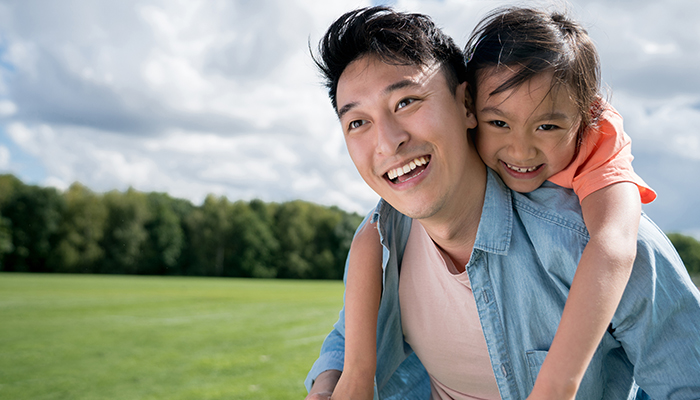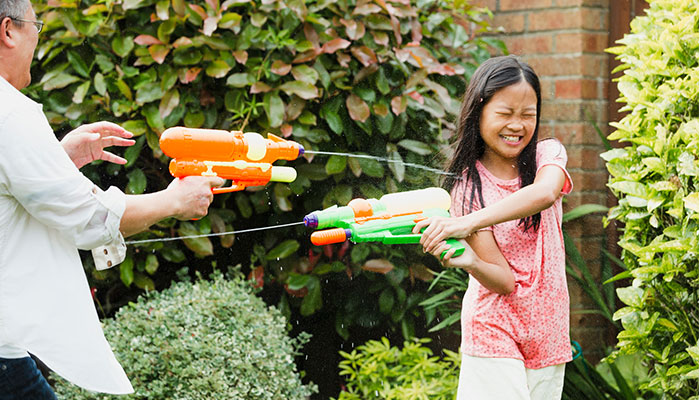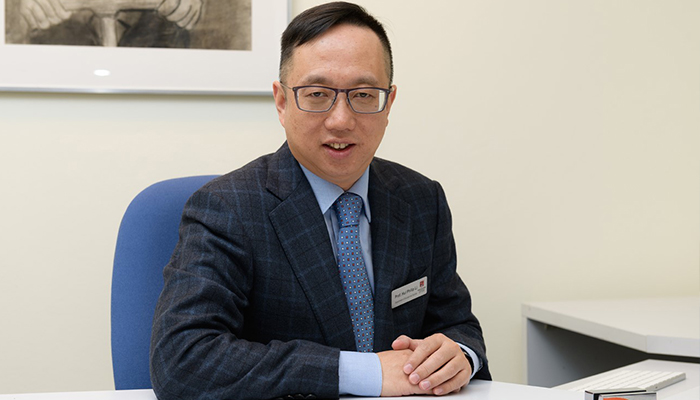Battle Hymn of the Tiger Mother by Amy Chua famously coined a term that became synonymous with a strict, demanding style of parenting.

Relaxed: panda dads want their kids to play rather than feel pressure around academic achievement, the study found.
It was associated with traditional Chinese parenting practices, which placed high expectations on children for academic achievement and restricted their extracurricular activities.
Now, researchers have identified the emergence of the ‘panda dad’, a ‘lovely’, easy-going but supportive parent who wants his offspring to be happy, says Professor in Early Childhood at Macquarie University’s Department of Educational Studies, Philip Li.
Panda dads are common in Australia, Professor Li says – and his research in the Chinese city of Shenzhen shows they are now emerging in China, giving traditional tiger mums – and tiger dads – a run for their money.
“We found that in today’s Chinese cities, many highly educated parents, especially fathers, are nice, supportive and easy-going to children,” says Li.
These panda fathers, unlike the tiger mothers described by Chua, were highly responsive to their children’s needs and gave autonomy support to their children.”
“They are not so authoritarian, because they think kids should play, and grow up without any pressures, because they want their kids to have a happy childhood.”
The study, ‘Tiger mom, panda dad’: a study of contemporary Chinese parenting profiles’, published in the journal Early Child Development and Care, was carried out in Shenzhen, a modern and prosperous city whose population of more than 10 million is the most educated in China.
- Faster, higher, emotionally stronger: risks help kids avoid anxiety
- Children who have music lessons are quick learners
The study involved 86 middle-class couples who were parents of preschool-aged children attending a kindergarten in the CBD of Shenzhen, which was China’s first special economic zone following economic reform in the 1980s. The parents completed a comprehensive parenting questionnaire, with four of the couples interviewed to provide additional insight.
Disagreeing is OK with easy-going panda parents
The study’s goal was to explore whether it was common to have two parenting styles in one family, and also to determine which parenting profile was most popular – the supportive ‘panda’; the easy-going ‘sheep’; or the authoritarian ‘tiger’.
Supportive parenting, explains Li, is high on positive measures including warmth and support (for example, giving comfort and understanding when the child is upset); reasoning and induction (for example, helping the child to understand the impact of behaviour by encouraging them to talk about the consequences of their own actions); democratic participation (for example, encouraging the child to express themself even when disagreeing with parents.
Easy-going parenting is a kind of permissive parenting style that sometimes seems to be indulgent.
Tiger parenting (authoritarian) features a physical coercion dimension (for example, spanking when the child is disobedient); a verbal hostility dimension (for example, scolding and criticism when the child’s behaviour doesn’t meet their expectation); and non-reasoning or punitive (for example, when the child asks why they have to conform, the parent says things like ‘because I said so’, or ‘I am your parent, and I want you to’).
Results from the study showed that 40 couples had the same parenting style as their spouse, while 46 couples had different styles to each other.
Mums crack the whip more than dads
Mothers were significantly more likely to be authoritarian than fathers, possibly due to the fact that “fathers spend relatively little time with their children and, therefore, would be less likely to use a high-power parenting style,” the study said.

Nice guys: panda dads are not authoritarian and would prefer to play with their children, the study found.
Easy-going parenting was the most popular profile (42%, of which 54% were mothers), followed by tiger parenting (39%, of which 53% were mothers), and supportive parenting (19%, of which 34% were mothers).
“The Chinese fathers significantly outnumbered mothers in the supportive parenting profile,” the study says. “Therefore, panda father is an appropriate term to describe these fathers, contrasting with the well-known tiger mother," Prof Li said.
“These panda fathers, unlike the tiger mothers described by Chua (2011), were highly responsive to their children’s needs and gave autonomy support to their children.”
Li, who moved to Australia from China in 2018, says economic reforms and growing wealth in his home country are behind the emergence of the panda dad in cities like Shenzhen. As well, today’s parents may be more easy-going and supportive as a reaction to their own upbringing with authoritarian parents, Li says.
“As a kid in China 45 years ago, I had a tiger mum, but also my dad was very strict, so it was tough for me,” Li says.
“You can see many parents in Shenzhen, especially dads, are very educated and they often get their higher education from other countries and return from those countries with Western values. That is, be nice to kids, don't be so stressful and don't be so firm."
Parenting style affects literacy
Li says it’s important to understand parenting styles because there is a cause-effect relationship between how children are parented and their outcomes in early childhood in areas such as literacy and school preparedness.

Strict upbringing: Prof Li, who says he had two tiger parents growing up, studied whether it was common to have two parenting styles in one family.
Research showed, for instance, that tiger mum parenting did not necessarily correlate with higher outcomes for children in today’s China, because kindergarten, which many children attend full-time from age 3, now took some of the onus of education away from the home.
“Many decades ago, tiger mums perhaps had the best outcomes in children’s early development,” Li says, “but with today’s child there are two sources of education, home and school, and to be frank the major contribution comes from kindergarten.”
Like the Kungfu Panda, says Li, Panda Dad will be more and more popular in the world, “because they are easy-going, nice, supportive, and also exceptionally skilful!”
Philip Li is a Professor in Early Childhood in the Department of Educational Studies, Macquarie University.



